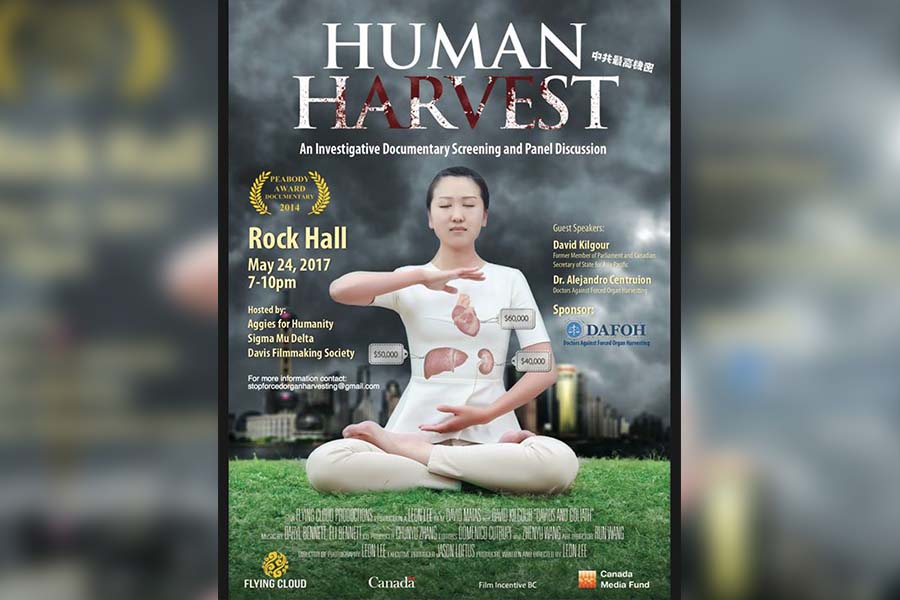
Documentary screenings on campus
Documentaries are a form of film art that have long been used to tell the true stories and histories of various people, while nonetheless serving as an artistic expression. In this sense, they form a unique intersection between creativity and awareness of social issues. Students have been utilizing documentary screenings on campus as a means of spreading awareness of issues they are passionate about and mobilizing action toward addressing these issues.
Justin Kaplan, a third-year political science major, has been a part of this documentary culture as president of Aggies For Humanity (AFH). As a part of its work, AFH holds occasional documentary screenings about various issues, and recently held a screening of The Human Harvest, a documentary which explores organ harvesting crimes in China.
“I didn’t know that was an issue,” Kaplan said.
Kaplan appreciates that documentaries often portray an issue from someone else’s perspective. He found that what viewers might believe to be a solution to an issue may not be fully appropriate for the people living in that reality.
“Our issue for Aggies For Humanity this year was homelessness,” Kaplan said. “Toward the beginning of the year we did [a screening] about homelessness in San Francisco. It was interesting to see — from the perspective of the homeless people of course — [that] some of the people had the disposition that being homeless wasn’t necessarily a bad thing. It reminded me of some rural Middle Eastern community where a Western nonprofit organization went in and built houses for people, because they didn’t have houses [there]. When they built these homes, the people ended up using them for their livestock. [So] it’s easy to look at someone and say, ‘hey, you don’t have something, obviously my way of life is better’ — but it’s not always that case. It’s important to tackle these issues from others’ perspectives.”
Lily Karim, a first-year biomedical engineering major and a member of the Sexual Assault Awareness and Advocacy Committee , spearheaded a screening of The Hunting Ground in April — Sexual Assault Awareness Month. She chose to hold a documentary screening instead of presentation because she believed it would be a more effective way to communicate complex realities.
“I can’t really tell the stories of sexual assault as well as actual victims and people who are fighting for better treatment towards victims all the time,” Karim said. “I could’ve done a presentation on sexual assault and rape culture on college campuses, but I think that this movie and hearing these testimonies from victims was much more impactful. [And] there’s a lot of documentaries about toxic masculinity and how that plays a role in rape culture and gender norms, [which] really harm the ability to overcome gender-based violence”
Karim also believes there is an educational value in engaging with these first-person narratives.
“I just [feel] it’s a really good idea to mix our education with supplemental resources such as documentaries,” Karim said, “especially having it in an environment where you have to actively seek out and choose this kind of education. When someone has a lot of passion and seeks out primary sources of information, there’s just something really effective about it. [But] I think that it’s not just the education component to it that we need to consider — it’s also the ability to create an emotional response.”
Anita Yu, a fourth-year political science and English double major and president of the Davis Filmmaking Society, receives many requests for documentary screenings and help with publicity. Most of those who reach out to Yu are passionate about a social issue and want help in spreading awareness.
“I get the sense that a lot of people who do documentary screenings want to inspire change on campus in a very real way,” Yu said. “From the pattern [of requests], it’s not just screening a documentary to say ‘this is a problem,’ they also say ‘this is a problem and we can do something about it.’ That seems to be very much the intention of every documentary screening that I’ve heard about.”
However, Yu complicated the idea of straightforward storytelling by a documentary. Even though the film shares true stories, it is nonetheless framed by a person with their own creativity and ideas. But at the same time, Yu believes that such an artistic expression can sometimes be a more true rendition of one’s story than simply stating facts.
“I do think documentaries are so inspiring,” Yu said. “They’re so probing. They’re like a video essay, but fun to be a part of, fun to consume and learn from. It’s so artful. Just because it’s about true stories, doesn’t mean the very art of the film form is irrelevant. It’s actually really important.”
Whatever their chosen creative outlet may be, Aggies are actively fighting for causes that they are passionate about. Whether it is through concerts for refugees or a night of poetry, these forms of art become the scaffolding upon which social issues can be manifested, talked about and fought for.
“There are plenty of ways to do it,” Kaplan said. “These issues aren’t fun [the creative outlet is good] to try and — not necessarily see the light — but to remain optimistic in these situations that [through] what we are doing, even in small Davis, somehow we are making a difference.”
Written by: Sahiti Vemula — features@theaggie.org



